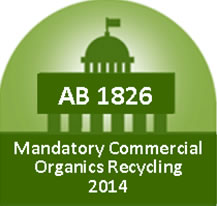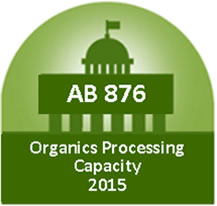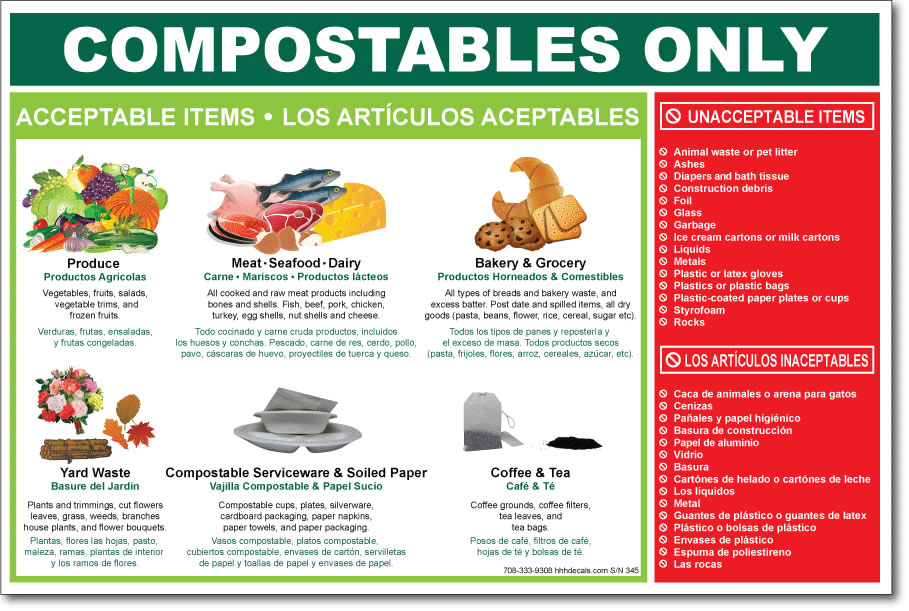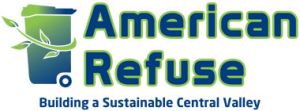Organics Recycling
What Is Organics Recycling?
“Organics” recycling consists of food waste, yard waste, and soiled paper products with food. Organic waste can be defined as the following materials: food waste, green waste, landscaping, pruning waste, non-hazardous food waste, food soiled paper mixed with food; other “organic” material.
Why Is The State Requiring I Recycle My Organic Waste?
The intended purpose of AB 1826 is to help reduce greenhouse gas (GHG) emissions by diverting organic waste to recycling efforts. It is estimated that 30 million tons of waste goes into our landfills a year. When organics are left to decompose on their own, they are a source of emissions contributing to green house gases. When recycled through anaerobic digestion they become a renewable energy and fuel source. Organics can also be used in composting and mulching for our farm lands.
Who Is Currently Required To Recycle Organics?
Businesses or Multifamily units with five (5) or more units, who generate more than two (2) cubic yards of TRASH a week. As of January 2019 the law changed from four (4) cubic yards of organics to four (4) cubic yards of trash per week. As of September 2020, Cal Recycle has dropped the cubic yardage from (4) to (2) cubic yards of trash per week.
*(note multi-family does not require a “food waste” program but does require recycling for yard waste).
*Schools and school districts (public entities) are included in this law. It is estimated that more than 8 tons of food waste can be composted from local schools every day.
State Laws

AB 1826 “Mandatory Commercial Organics Recycling” | Assembly Bill 1826 went into effect April 1,2016 requiring businesses to recycle their organic waste depending on the amount of waste they generate per week.
Who is affected? Businesses or Multifamily units with five (5) or more units who generate more than two (2) cubic yards of TRASH a week. The goal of the bill is to divert 50% of organics disposal from commercial businesses by 2020 as compared to 2014. The law changed in January of 2019 from four (4) cubic yards of organics to 4 cubic yards of trash per week. As of September 2020, Cal Recycle has dropped the cubic yardage from (4) to (2) cubic yards of trash per week.
*(note mulit-family does not require a “food waste” program).
Cal Recycle http://www.calrecycle.ca.gov/recycle/commercial/organics/
Requirements of Local Government: Local jurisdictions must have an Organic Waste Recycling Program in place. Jurisdictions must identify regulated businesses and multi- family units. Conduct outreach and education to inform those businesses how to recycle organic waste, monitor to identify those not recycling, and inform them of the law and how to recycle organic waste. By August 1, 2017 Jurisdictions must provide information about their Organic Waste Recycling Program implementation in the annual report submitted to CalRecycle
Enforcement: After receipt of the 2017 annual reports submitted, CalRecycle shall conduct its formal review of those jurisdictions that are on a two-year review cycle. On or after January 1, 2020, if CalRecycle determines that the statewide disposal of organic waste has not been reduced by 50% of the level of disposal in 2014, the organic recycling requirements on businesses will expand to cover businesses that generate 2 cubic yards or more of commercial solid waste per week. Additionally, certain exemptions may no longer be available if the 2020 target is not met. After receipt of the 2019 annual reports submitted on August 1, 2020, CalRecycle shall conduct its formal review of all jurisdictions. CalRecycle will continue to conduct the two- and four-year reviews after this cycle.
 AB 876 “15-Year Organic Processing Capacity”| Assembly Bill 876 was passed in 2015 and compliments AB 1826. Beginning August 1, 2017 it will be required that an estimate of the amount of organics generated by each city over a 15 year period be included in their annual report to Cal Recycle. In addition, it calls for an estimate of the additional organic waste capacity that will be needed to process that amount of waste, and areas identified by the County or regional agencies as potential locations for new or expanded organic waste recycling facilities capable of safely meeting that additional need. Who is affected? Cities, Counties and Regional Agencies
AB 876 “15-Year Organic Processing Capacity”| Assembly Bill 876 was passed in 2015 and compliments AB 1826. Beginning August 1, 2017 it will be required that an estimate of the amount of organics generated by each city over a 15 year period be included in their annual report to Cal Recycle. In addition, it calls for an estimate of the additional organic waste capacity that will be needed to process that amount of waste, and areas identified by the County or regional agencies as potential locations for new or expanded organic waste recycling facilities capable of safely meeting that additional need. Who is affected? Cities, Counties and Regional Agencies
Cal Recycle http://www.calrecycle.ca.gov/lgcentral/AnnualReport/OrganicInfra.htm
How Can American Refuse Help You?
AB 1826 - American Refuse can assist businesses and multifamily dwellings with education and proper containers for organics recycling. Our staff can help identify businesses that may need assistance and come up with a program to achieve compliance. Education and monitoring is the key to success. Our software can also assist in reporting to Cal Recycle for annual reports. American Refuse is partnering with other companies to help reduce and re-use food waste.
AB 876 – American Refuse has prepared an Organic Waste Recycling Plan providing 15-years of organic waste generation and demonstrating 15-years of organic waste processing capacity at Kern County facilities.
What Can I Put In Organic Recycling?
Food Waste: Food Scraps, fruit, vegetables, egg shells, cheese, bread, rice, pasta, tortillas, beans, nuts, coffee filters, tea bags.
“Soiled Food Waste Containers”: Cardboard trays, paper plates, paper food boats, paper napkins, paper towels, paper cups, , fast food wrappers, cardboard egg cartons, used pizza boxes, paper take out containers, ice cream containers, milk and juice cartons.
Yard Waste: branches, grass, cactus, leaves, clippings, brush, yard trimmings, and flowers.




